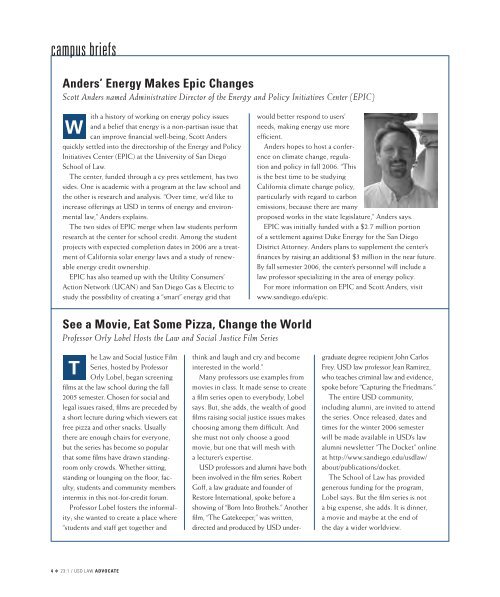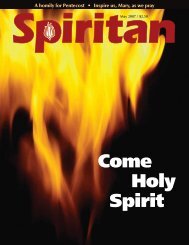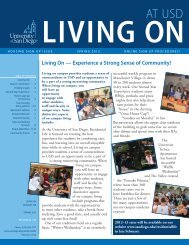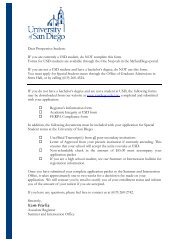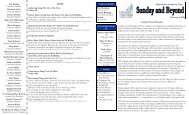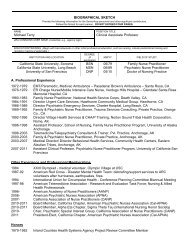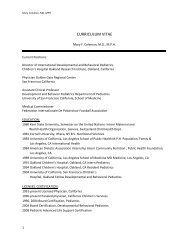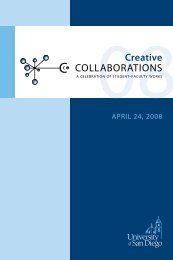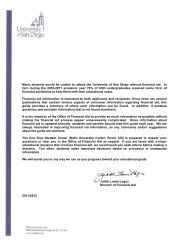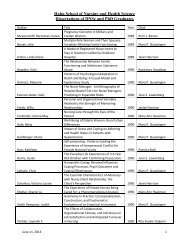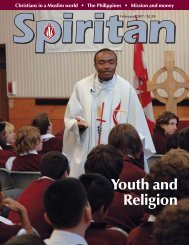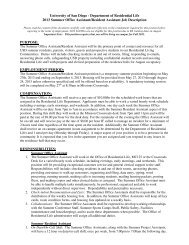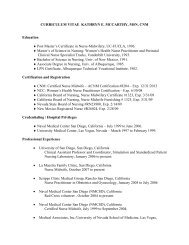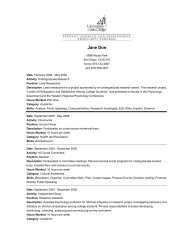Kevin Cole - University of San Diego
Kevin Cole - University of San Diego
Kevin Cole - University of San Diego
You also want an ePaper? Increase the reach of your titles
YUMPU automatically turns print PDFs into web optimized ePapers that Google loves.
campus briefs<br />
Anders’ Energy Makes Epic Changes<br />
Scott Anders named Administrative Director <strong>of</strong> the Energy and Policy Initiatives Center (EPIC)<br />
ith a history <strong>of</strong> working on energy policy issues<br />
and a belief that energy is a non-partisan issue that<br />
W can improve financial well-being, Scott Anders<br />
quickly settled into the directorship <strong>of</strong> the Energy and Policy<br />
Initiatives Center (EPIC) at the <strong>University</strong> <strong>of</strong> <strong>San</strong> <strong>Diego</strong><br />
School <strong>of</strong> Law.<br />
The center, funded through a cy pres settlement, has two<br />
sides. One is academic with a program at the law school and<br />
the other is research and analysis. “Over time, we’d like to<br />
increase <strong>of</strong>ferings at USD in terms <strong>of</strong> energy and environmental<br />
law,” Anders explains.<br />
The two sides <strong>of</strong> EPIC merge when law students perform<br />
research at the center for school credit. Among the student<br />
projects with expected completion dates in 2006 are a treatment<br />
<strong>of</strong> California solar energy laws and a study <strong>of</strong> renewable<br />
energy credit ownership.<br />
EPIC has also teamed up with the Utility Consumers’<br />
Action Network (UCAN) and <strong>San</strong> <strong>Diego</strong> Gas & Electric to<br />
study the possibility <strong>of</strong> creating a “smart” energy grid that<br />
See a Movie, Eat Some Pizza, Change the World<br />
Pr<strong>of</strong>essor Orly Lobel Hosts the Law and Social Justice Film Series<br />
he Law and Social Justice Film<br />
Series, hosted by Pr<strong>of</strong>essor<br />
T Orly Lobel, began screening<br />
films at the law school during the fall<br />
2005 semester. Chosen for social and<br />
legal issues raised, films are preceded by<br />
a short lecture during which viewers eat<br />
free pizza and other snacks. Usually<br />
there are enough chairs for everyone,<br />
but the series has become so popular<br />
that some films have drawn standingroom<br />
only crowds. Whether sitting,<br />
standing or lounging on the floor, faculty,<br />
students and community members<br />
intermix in this not-for-credit forum.<br />
Pr<strong>of</strong>essor Lobel fosters the informality;<br />
she wanted to create a place where<br />
“students and staff get together and<br />
4 ❖ 23:1 / USD LAW ADVOCATE<br />
think and laugh and cry and become<br />
interested in the world.”<br />
Many pr<strong>of</strong>essors use examples from<br />
movies in class. It made sense to create<br />
a film series open to everybody, Lobel<br />
says. But, she adds, the wealth <strong>of</strong> good<br />
films raising social justice issues makes<br />
choosing among them difficult. And<br />
she must not only choose a good<br />
movie, but one that will mesh with<br />
a lecturer’s expertise.<br />
USD pr<strong>of</strong>essors and alumni have both<br />
been involved in the film series. Robert<br />
G<strong>of</strong>f, a law graduate and founder <strong>of</strong><br />
Restore International, spoke before a<br />
showing <strong>of</strong> “Born Into Brothels.” Another<br />
film, “The Gatekeeper,” was written,<br />
directed and produced by USD under-<br />
would better respond to users’<br />
needs, making energy use more<br />
efficient.<br />
Anders hopes to host a conference<br />
on climate change, regulation<br />
and policy in fall 2006. “This<br />
is the best time to be studying<br />
California climate change policy,<br />
particularly with regard to carbon<br />
emissions, because there are many<br />
proposed works in the state legislature,” Anders says.<br />
EPIC was initially funded with a $2.7 million portion<br />
<strong>of</strong> a settlement against Duke Energy for the <strong>San</strong> <strong>Diego</strong><br />
District Attorney. Anders plans to supplement the center’s<br />
finances by raising an additional $3 million in the near future.<br />
By fall semester 2006, the center’s personnel will include a<br />
law pr<strong>of</strong>essor specializing in the area <strong>of</strong> energy policy.<br />
For more information on EPIC and Scott Anders, visit<br />
www.sandiego.edu/epic.<br />
graduate degree recipient John Carlos<br />
Frey. USD law pr<strong>of</strong>essor Jean Ramirez,<br />
who teaches criminal law and evidence,<br />
spoke before “Capturing the Friedmans.”<br />
The entire USD community,<br />
including alumni, are invited to attend<br />
the series. Once released, dates and<br />
times for the winter 2006 semester<br />
will be made available in USD’s law<br />
alumni newsletter “The Docket” online<br />
at http://www.sandiego.edu/usdlaw/<br />
about/publications/docket.<br />
The School <strong>of</strong> Law has provided<br />
generous funding for the program,<br />
Lobel says. But the film series is not<br />
a big expense, she adds. It is dinner,<br />
a movie and maybe at the end <strong>of</strong><br />
the day a wider worldview.


